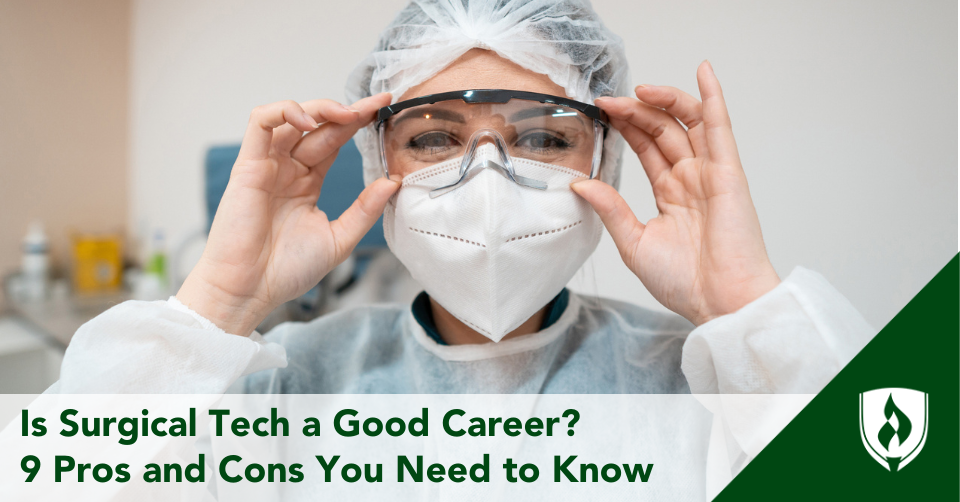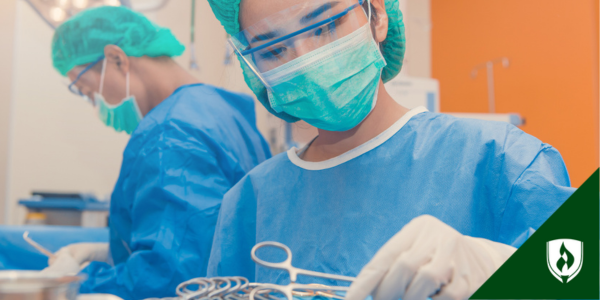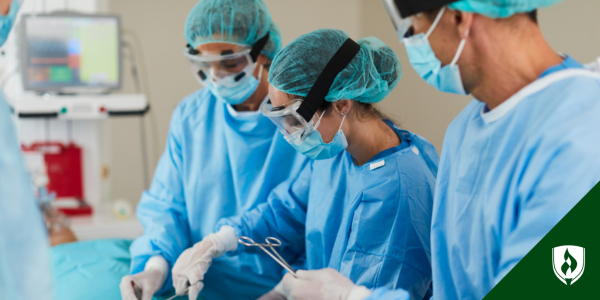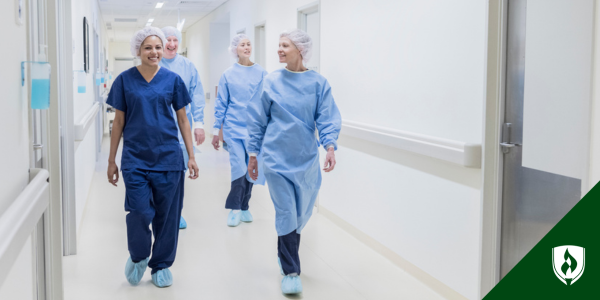
Surgical technologist, also known as scrub tech or surg tech, play a vital role in the operating room. You’ve heard of the role, which puts you in the rare group of people familiar with different surgical careers. Most people who consider a role in healthcare don’t run across the job of a surgical technologist and never get the chance to see if it would be a good fit for them.
In that sense, you have a real head start. There are so many interesting careers out there—and that’s especially true within healthcare. If you’re looking for a career that can also be a way to help people and aspire for excellence, working in the healthcare industry is a great choice.
Still, at this point in your career path, you’re not quite sure yet of your destination.
There are so many branches of patient care you could pursue.
But, working in surgery does sound like a dream—and going to (and paying for) medical school to become a surgeon sounds like a nightmare.
You might think surgical technology could be the answer. Before you commit to anything though, weigh some pros and cons to see how the career stacks up against your needs.
What is it really like to spend your workday in the operating room?
Here are 9 pros and cons of a surgical technology career
Pro: You won’t need a Bachelor’s degree
Advanced education is never a bad thing. But, if you’re looking to get your career off the ground ASAP, surg tech may be an especially attractive option.
Unlike other medical professionals, surgical technologists aren’t required to have a “four-year” degree.
Instead, you can become a surgical tech with just an Associate’s degree. That means you could be finished with school in as few as 21 months.1,9
An Associate’s degree program in surgical technology from a program that is accredited by the Commission on Accreditation of Allied Health Education Programs (CAAHEP) or Accrediting Bureau of Health Education Schools (ABHES®).
Then, if you pass, you can start exploring surg tech employment opportunities.
Con: You’ll be on your feet all day
Surgical technology is a very hands-on role—even compared to other hands-on healthcare careers. For surgical technologists, the work is physically demanding.
You’ll prepare patients before each surgery and work through long hours of operation in the OR. From sterilizing equipment to keeping retractors in place for the surgeon, very few of your tasks—if any—can be completed from a chair. The surgeon relies on you for everything from sterilizing equipment to preparing operating rooms and even disinfecting incision sites.2
Some surgical technologists are also responsible for transferring patients to the recovery room post-procedure. If you’ve been working on your upper body strength, it’ll pay off in this work environment!
Pro: You don’t really have to do paperwork
Hate filling out forms? All the more reason to pursue a career in surgical technology.
Many healthcare professionals wind up doing a ton of admin and paperwork tasks through the week. (Looking at you RNs, Physicians and Physical Therapists!) The documentation needed for the operating room is usually handled by the registered nurses on the surgical team, according to Jill Teodoro, professor of Surgical Technology at Rasmussen University.
Con: You’ll have to get used to head-to-toe PPE
Remember 2020, wearing N95 masks and smelling your breath all day?
Not only will you mask up for the operating room—as a surgical technologist, you’ll sport enough PPE (personal protective equipment) to be rendered unrecognizable. If you hate the thought of suiting up like an astronaut about to disembark on planet STERILE FIELD, a career less localized to the operating room would be a better choice for you.
What kind of PPE should you expect?
Head protection
A healthy person sheds between 50 and 100 hairs every day, according to the American Academy of Dermatology Association.2
Surgeons and surgical technologists need to ensure their work environment stays free and clear of those falling strands, as well as skin squames (flakes of dead skin tissue our bodies shed naturally) and dandruff.3
There are a few different PPE options designed for this purpose:
- Skull caps (also referred to as “scrub caps” or “surgical caps”)
- Surgical bouffants (sometimes called “surgical bonnets”)
- Surgical hoods (these help keep long, burly beards from shedding on patients in the operating room)
Interestingly, the medical community has engaged in a years-long debate about the efficacy of surgical caps vs. bouffants. This is the kind of thrilling discourse you can expect when you work in surgery!
Dry jokes aside, protecting patients from contaminants is genuinely a life-or-death matter.
Face protection
In the OR, you’ll protect your eyes from splashes, droplets, bone fragments and other potentially infectious material (OPIM).
“Goggles that are indirectly vented with a manufacturer’s anti-fog coating are the recommended protective eyewear,” according to the Association of Surgical Technologists® ( AST). Also worth noting is the AST’s specification that “prescription eyeglasses and contact lenses are not considered eye protection.”4
Gloves and body protection
Double gloving is recommended for all surgical procedures by the AST.5 And that’s just the tip of the iceberg.
Over your scrubs, you’ll don a surgical gown. (If you’re wondering, no, that’s not the same backless gown patients wear.)
A surgical gown is a long-sleeved, knee-length garment for added protection against blood spatter and other airborne matter in the operating room.
Some patients, such as those receiving orthopedic surgery, will require X-rays in the operating room. In those instances, you’ll add a lead apron to your PPE. If you are within two feet of the beam during a fluoroscopy (X-ray) procedure, the AST also recommends wearing a lead thyroid shield and leaded eyeglasses.6
Are you getting the astronaut vibes yet?
Shoe covers
While not technically required, some surgical techs keep a “clean” pair of shoes at work to help protect the sterile environment.
Whether you choose to do the same, or you wear your outside shoes in the OR, you can’t just rock up in your comfiest pair of kicks. You might also need knee-high boot style covers, depending on how bloody and splashy the operation is likely to be, according to the AST.
Pro: Your colleagues will all be trusted medical professionals
Not everybody gets to say they work alongside surgeons, saving and changing lives. But that’s exactly what a surgical tech does.
Surgical techs most commonly work in hospitals, outpatient care centers and physicians’ offices, according to the Bureau of Labor Statistics.7 You may work with specialists, like neurosurgeons, or you could be part of a general surgery team.
You may even share duties with the surgical assistant (sometimes referred to as the surgical first assistant).1 This will depend on your employer’s size, requirements and operating team structure.
Nonetheless, becoming a surgical tech introduces you to a whole network of talented doctors, nurses and other medical professionals whom you’ll continue to learn from all throughout your career. Like you, these people are not afraid to get their hands dirty (figuratively of course, because PPE and sterile field) helping fellow human beings.
That doesn’t mean everyone will be friendly or that tensions won’t run high. But when a colleague is snappy as they are handing you someone’s literal heart, it’s easier to forgive.
Con: You may have to work on nights, weekends or holidays
While there are many rewarding aspects of a healthcare career, there’s also one major downside: hospitals don’t close.
Surgeries aren’t always planned. Somebody needs to be available for emergency situations, and, when you’re a surgical technologist, that somebody might be you.
If you really want to avoid overnights, or need a more traditional rhythm, you could aim for employment in a clinic (if there’s one in your area that handles some routine surgeries on site). Or you could focus on oral surgery and seek employment in a dental office! But note that the majority of surgical techs work in hospitals.
Pro: You’ll get to assist with surgical procedures
Prior to each operation, you’ll help prepare the sterile field. Collecting and sanitizing all tools, equipment and instruments also falls under your domain. If your OR uses surgical robots, you’ll also drape out the robot.
Then, during the procedure, you’ll help to clean incision areas, hold internal organs in place and even cut sutures for the surgeon. Again, you’ll maintain sterile field while keeping track of tools, sponges and other instruments to help protect patient safety.
And, finally, once the procedure’s complete, you’ll help apply bandages and other dressings to incisions before transferring your patients out of the OR.1
Surgery is a team effort, and surgical techs play a key role!
Con: Surgical technologists have high-pressure jobs
Dealing with life-or-death situations will up the ante on anyone’s stress level. Even elective surgeries have their risks.8 Complacency and distraction are not allowed when you are opening someone’s insides to the outside world.
Couple that internal pressure with external factors—moody coworkers, heart-wrenching patient stories and the occasional unfriendly surgeon—and it’s pretty easy to see why surgical techs need to have thick skin. Everyone on the surgical team has to be able to check their issues and their egos at the operating room door and scrub in as the powerful professionals they are.
Pro: You won’t just have a job—you’ll have a meaningful career
We all have to work, but not every job creates a sense of purpose. Working in surgical technology is so much more than just earning a paycheck.
Every day could go a bit different. Bodies are complicated, supplies run scarce, technology changes—and through it all, you’re there, helping to keep patients safe.
And with every surgery you help complete, you’ll strengthen your skills and set yourself up for future advancement opportunities. (See “What is the Surgical Tech Career Path? From Start to Advancement” for specifics on what your potential career advancement could look like).
Ultimately, each day in the OR is another chance to help make lives better—and that includes your own.
Is surgical technology the right career for you?
You’ve got a good sense of the surg tech role, now. Can you see yourself in this career?
Related Articles:
- Anesthesia Tech vs. Surgical Technologist: Comparing These Distinct OR Positions
- What is the Surgical Tech Career Path? From Start to Advancement
- A Peek Behind the Curtain: What Are Surgical Tech Clinicals Really Like?
- Surgical Technologist Duties: A Day in the Life
Association of Surgical Technologists® is a registered trademark of Association of Surgical Technologists, Inc.
ABHES® is a registered trademark of Accrediting Bureau of Health Education School.
Certified Surgical Technologist is a registered trademark of the National Board of Surgical Technology and Surgical Assisting.
1Surgical Assistants and Technologists [accessed December 2023] https://www.bls.gov/ooh/healthcare/surgical-technologists.htm#tab-2
2Do You Have Hair Loss or Hair Shedding? [accessed December 2023] https://www.aad.org/public/diseases/hair-loss/insider/shedding
3AST Standards of Practice for Surgical Attire, Surgical Scrub, Hand Hygiene and Hand Washing [accessed December 2023] https://www.ast.org/uploadedfiles/main_site/content/about_us/standard_surgical_attire_surgical_scrub.pdf
4AST Guidelines for Best Practices in Use of Eye Protection During Surgical Procedures [accessed December 2023] https://www.ast.org/uploadedFiles/Main_Site/Content/About_Us/ASTGuidelinesEyeProtection.pdf
5Standards of Practice for Gowning and Gloving [accessed December 2023] https://www.ast.org/uploadedFiles/Main_Site/Content/About_Us/Standard_%20Gowning_and_Gloving.pdf
6AST Standards of Practice for Ionizing Radiation Exposure in the Perioperative Setting [accessed December 2023] https://www.ast.org/uploadedFiles/Main_Site/Content/About_Us/Standard%20Ionizing%20Radiation%20Exposure.pdf
7Surgical Assistants and Technologists [accessed December 2023] https://www.bls.gov/ooh/healthcare/surgical-technologists.htm#tab-3
8The Risk of Postoperative Complications After Major Elective Surgery in Active or Resolved COVID-19 in the United States [accessed December 2023] https://www.ncbi.nlm.nih.gov/pmc/articles/PMC8745943/
9Completion time is dependent on transfer credits accepted and the number of courses completed each term




